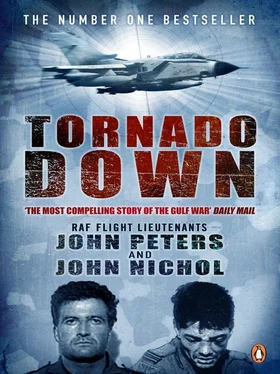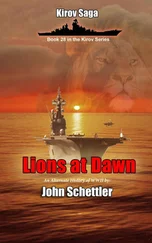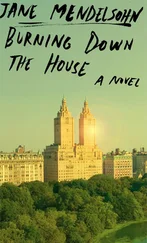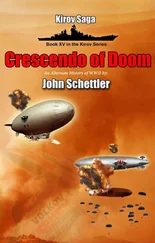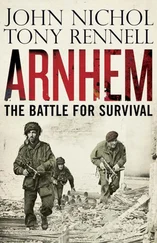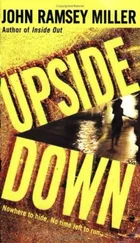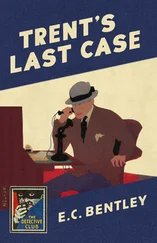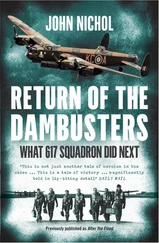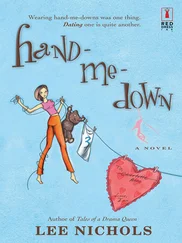John Nichol: Bahrain was teeming, a bubbling cauldron of activity. From the air, as we looped down over the city through the morning heat haze, it had looked sleepy, washed out, colourless, the buildings beige against the surrounding sand. Now, as we emerged blinking from the dark interior of the Hercules, there was colour and movement everywhere: aircraft, troops, vehicles and stores.
We stepped out into organised chaos. Every square inch of tarmac on the field was occupied: aside from the big international civilian airliners, the skyline was dominated by more than thirty great grey-painted USAF C-130 aircraft. One of these enormous transports was flying the skull and crossbones, the black-and-white pirate flag fluttering jauntily from its cockpit window. As for the British presence, fourteen Tornados were lined up beak to beak; there was also a squadron of Jaguars, a detachment of Victor tankers, several RAF Hercs, and two more on loan from the New Zealand Air Force. There was a Royal Air Force Regiment squadron, armed with the Rapier antiaircraft missile system, living in splendid discomfort on a spit of land sticking out into the harbour. There were thousands of US Marines moving through, US Navy and US Marine Corps helicopters shuttling men and stores in and out continuously, trucks, buses and jeeps shuttling troops – it was a hive of war and it was buzzing. There were hardened emplacements all over the airfield already, Triple-A batteries, missile sites, ammo dumps. There were pyramids of spare parts and weapons piled up on wooden pallets, small mountains of JP-233s. Fork-lift trucks scuttled about like busy beetles. It looked like a full dress-rehearsal for Armageddon. The War Operations Centre (WOC), which would be our focus, looked extremely businesslike. It was surrounded by massive walls of sand-filled, sand-coloured oil-drums, towering high in rows two-deep, providing basic protection against air attack.
The moment the Here’s wheels stopped rolling, its crew began the frantic business of unloading, frantic because there was so much pressure on these transport aircraft, with all the equipment to shift to the Gulf. We all mucked in getting our huge quantities of personal kit off, including a bicycle some super-sensible colleague had brought with him. Like myself, JP had taped his kit-bags up with bright red sticky tape, so we were able to rescue them from the mounds of identical baggage pretty quickly.
First thing, we popped into the Operations Wing to take a quick look at our new environment. In our olive-green flying-suits, we felt very much like the new boys in school; everyone else had already switched over into their sand-coloured desert kit, so that they blended in nicely with the scenery. But there were quite a few other things that had not changed. In layout, the Ops Wing was just like home – almost identical to the WOC we had just left behind in Germany: there was an intelligence cell, one of its walls covered in a huge area map, detailing in full our own and the Iraqi military assets, their dispositions and strengths. There were the flying operations boards, which show aircraft and personnel status. And there was a ground-defence cell map, this one showing the layout of Muharraq, our new airfield, perched on the northwest tip of Bahrain. This map detailed Muharraq’s communications links and perimeter defences. Then there was COLPRO, or Collective Protection, essentially a giant inflatable rubber bag we would all jump into in the event of chemical or biological attack. Air is pumped continuously into this bag, thus maintaining a positive air pressure outwards, stopping the germs or the chemicals getting in – at least that is the theory. Ready-use gunracks lined the intervening corridors. A flying-clothing room was already set up, with piles of protective Nuclear, Biological and Chemical (NBC) kit, flying gear, water sachets… Even in the dimmed light, it was so familiar we had no trouble finding our way around.
The next thing, and an absolute priority, was to find out where the post office was. It turned out the mailboxes were in the Squadron crewroom, which was pretty plush by Portakabin standards. It was fully air-conditioned, had fridges full of drinks and chocolate, easychairs around the walls, tables holding up-to-date newspapers and magazines, and piles of ‘Blueys’ – airmail paper – to write home on. Everywhere you went on base there was the same smell of cold, dry, freshly laundered air, pouring from the air-conditioners, big metal hummingbirds in the ceiling.
Our arrival brief came next. Squadron Leader John Hurrel explained the security arrangements on Bahrain Island, and commented on the threat of attack. The Squadron Boss then arrived, and informed us we were flying that afternoon! We gave the Boss a good listening to, but there was a suppressed groan at this – flying, after eighteen hours on a Hercules! Mutter, mutter, mutter… In the event, he relented: we were given twenty-four hours off.
They took us to our accommodation; it was quite amazing. We knew it was going to be a large hotel, but we were not quite prepared for its splendiferousness. We drove away from the revetments and the bustle of Muharraq airbase, across the causeway, into Manamah city centre, along the seafront, past the rows of graceful palm trees swaying in the stiff offshore breeze, past the beached dhows, some of them quite new, some quite plainly rotting, their wooden ribs gaping at the sky. On the broad freeway, packed with American, Japanese and British cars, the skyscrapers were coming up thick and fast, as the cityscape grew more sophisticated. The jeep turned into the driveway of the Sheraton International Hotel. Marble floors, marble walls, marble reception desk, imposing cut-crystal chandeliers, a cool and glamorous foyer, a cool and glamorous receptionist behind the desk: we were staying here ? All of a sudden, we were no longer aircrew going to war, we were businessmen; the staff greeted us as such. And, in a way, they were right, we were businessmen. We were in the business of war – and, as one Texan officer we met drawled, business was picking up.
John Peters and I would be sharing a twin-bedded room. Oh well, you can’t have everything. We set about unpacking. There was about half as much storage space available as we needed. We both seemed to have packed just about everything we possessed in the entire world, just to be on the safe side. We should have listened to Bruce. About three days before we went out, JP got a phone call from the Gulf: Bruce Macdonald, a colleague, wanted to speak to him. JP asked him questions like: How much money will we need? What did he think we should bring, in the way of kit, that he forgot? and so on. He replied, ‘Don’t worry about any of that. The only thing you need to do is ring Jane [his wife] and get two bikinis from her and a tape of the Blue Danube . Oh, and a swim hat; and anything else that might help us with this Christmas revue we’re doing.’ Receiving so much overwhelming hospitality from the Bahrainis and the expatriate British community, the boys already out there were putting on a comedy revue for them in return. Clearly it was not all going to be war…
As it was December, the hot season in Bahrain was over, which meant the weather was like a perfect English summer’s day: blue sky, about eighty degrees Fahrenheit, low humidity… so we jumped into shorts and went down to swim away the flight fatigue. The pool bar at the Sheraton effectively became the RAF Officers’ Mess bar in Bahrain for the duration. What a spot of luck!
In the evening, the eight members of our formation went into Manamah, to the city centre, for a curry. Then we went for a wander around the old market, the souk , a wonderland to someone who had never been in one before. Gold- and silversmiths tapped away at their benches, pedlars of every good thing displayed food and leather goods, rugs and spices. The sights, the smells and the sounds were all completely strange and all completely absorbing. Happening upon a cross-legged tailor, an AH Baba character straight out of a children’s picturebook, we had ourselves measured up for desert flying-suits.
Читать дальше
